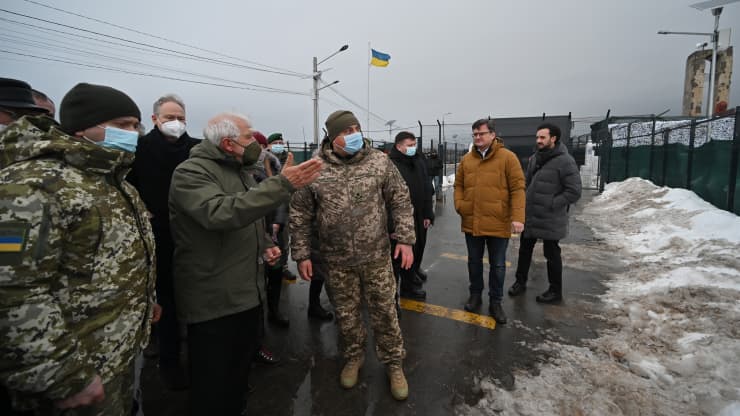POLITICS As the U.S. seeks to calm Russia tensions, Europe pushes to be included

The United States and Russia are having key talks next week and the EU’s top diplomat is disappointed that the bloc will not be around the table as well.
A potential Russian invasion of Ukraine is a top concern for many leaders, given multiple reports of heightened military activity close to the border. In a bid to ease these tensions, top U.S. and Russian officials will be gathering in Geneva, Switzerland on Monday. This meeting will precede wider talks between Russia and members of the North Atlantic Treaty Organization (NATO) on Wednesday.
However, the EU — the political and economic group of 27 nations — will not be present as a whole despite several of its members bordering with Russia.
“There is no security in Europe without the security of Ukraine. And it is clear that any discussion on European security must include European Union and Ukraine,” Josep Borrell, the EU’s high representative in charge of foreign affairs, said at a press conference on Wednesday.
“Any discussion about Ukraine must involve Ukraine first of all. And the talk about security in Europe cannot be done without not only the consultations, but the participation of the Europeans,” Borrell said in Ukraine, where he visited the eastern part of the nation where low-scale military skirmishes between Ukrainian troops and pro-Russian forces have been going on for several years.
This marked the first time that the EU’s top diplomat visited the conflict-hit region. However, an analyst at consultancy firm Teneo, said that the exclusion of the EU from the talks is not surprising.
“The sidelining of the EU from the upcoming talks is hardly surprising, given that NATO, and particularly the U.S., serves as the main guarantor of security in CEE (Central and Eastern Europe),” Andrius Tursa, said Wednesday in a note.
In fact, the EU as a whole does not have a strong defense capacity — it relies mostly on NATO, and to some extent on the U.S., when it comes to security.
But, regardless of its security capacities, there’s a lot at stake for the EU in upcoming talks with Russia, including on the energy front.
The majority of natural gas going into Europe already comes from Russia. In 2020, this represented about 43% of the total gas imports to the bloc, according to Eurostat. And a key pipeline between Russia and Germany, Nord Stream 2, is hanging in the balance amid the ongoing tensions with the Kremlin — this is a problem for Russia because it could be making more money from gas exports, and for the EU too because it could help containing some of the price increases registered in the last months.
Wolfgang Ischinger, former German ambassador to the U.S., told CNBC earlier this week that Nord Stream 2 is something that the EU can use to pressure Moscow.
“I think the pipeline represents a major item of leverage for us, if we handle it smartly,” Ischinger, now chairman of the Munich Security Conference, told CNBC’s Hadley Gamble.
Tags :
Previous Story
- Lebanon’s prime minister backs central bank governor despite...
- NASA's Webb telescope launches to see first galaxies,...
- Omicron impact immediate and substantial for Europe’s airports
- Astronomers uncover largest group of rogue planets yet
- Energy costs propel German producer prices almost 20%...
- EU plan for sweeping update of Big Tech...
- All Nippon Helicopter takes delivery of first Airbus...
- Glencore-run Australian coal mine emits methane equalling pollution...